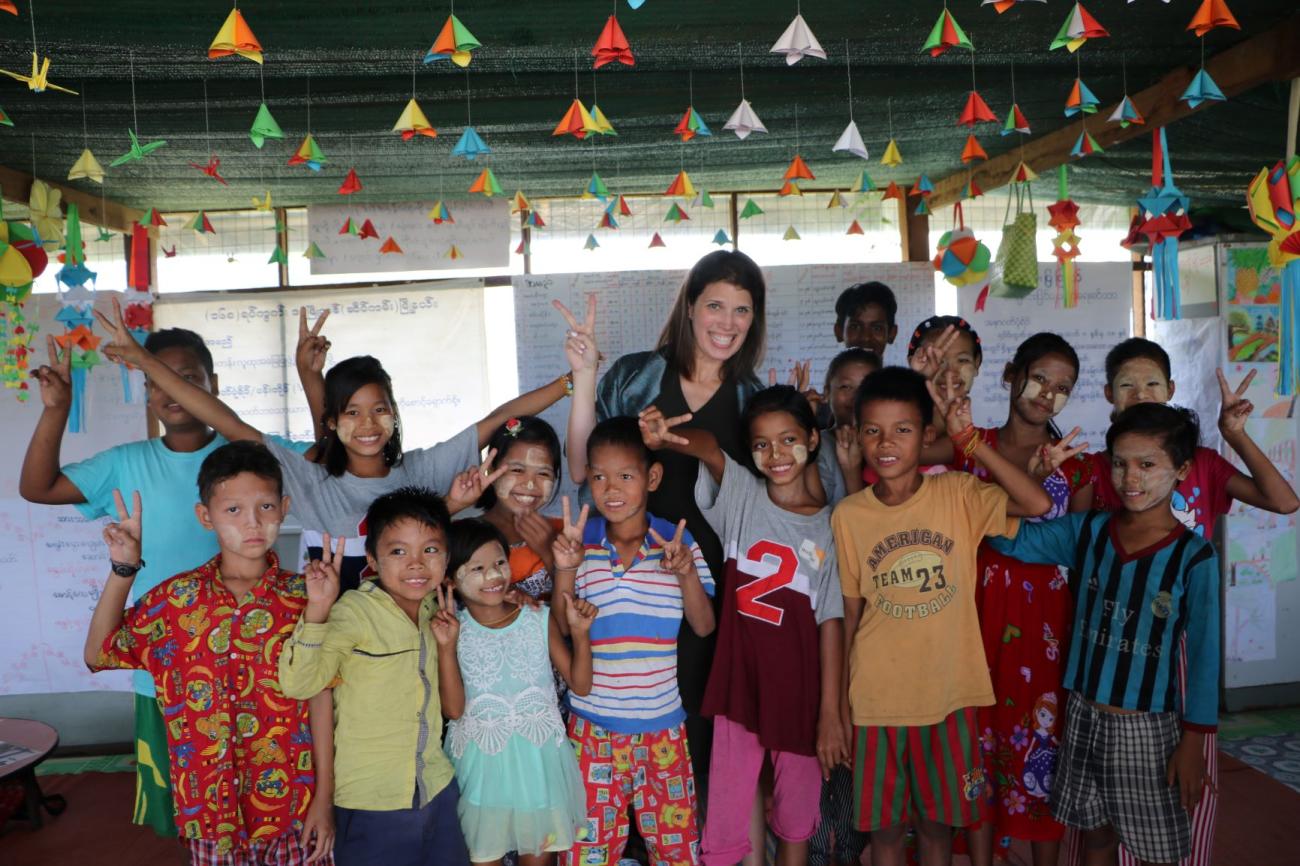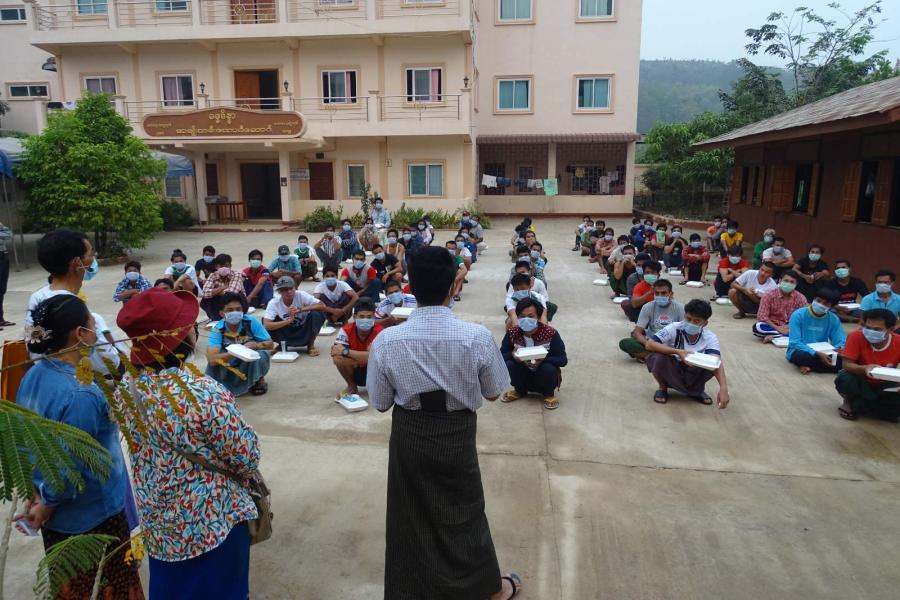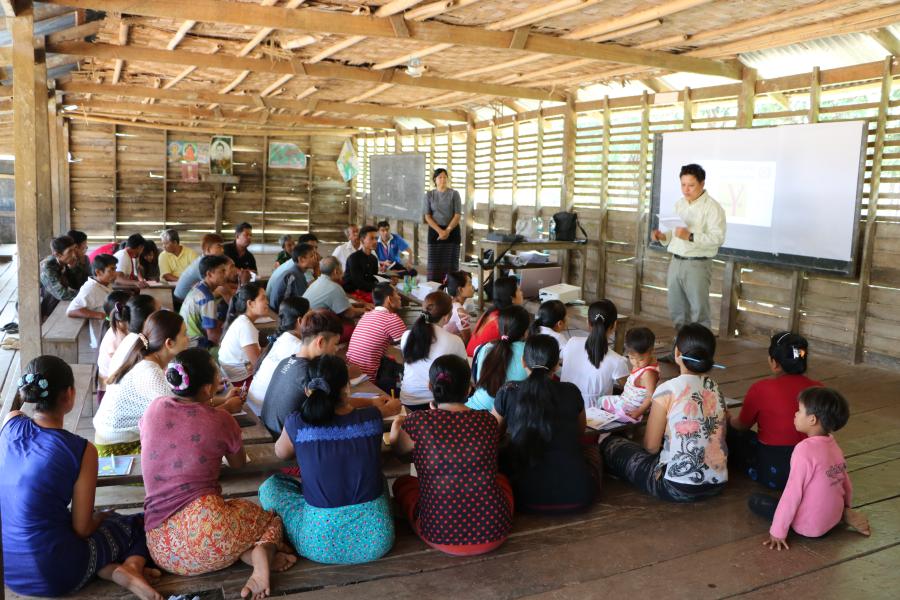United Nations supports livelihoods and job creation for thousands while responding to COVID-19 in Myanmar

The UN in Myanmar has come together as one to support COVID-19 preparedness and response. The next in a series of articles highlights ILO's contribution.
Practical support to the Government, employers and workers to respond to the pandemic
The International Labour Organization (ILO) offered immediate support to representative organizations of employers and workers to establish practical responses COVID 19. For example, this included support to trade unions in setting up an “Emergency Employment and Reskilling Centre” for garment workers who were laid off. It also included installing COVID-19 awareness billboards and delivering hand sanitizer, masks and pamphlets to factories. ILO’s support also helped create self-help groups to contribute seeds for the upcoming rainy season and provide poultry to farmers as well as providing training for laid-off workers to enable self-employment.
In relation to support for Small and Medium Size Enterprises, the ILO is conducting a survey of impacts and needs for Small Scale Enterprises (MEs) in target sectors (food processing, hotels and restaurants). The ILO is also researching SME training needs and is developing online versions of existing SME training products and design new training products based on identified needs. The ILO also plans to undertake value chain analysis for value chains with high potential to create jobs for affected target groups and to implement follow up interventions based on the analysis.
In the garment sector, building on a longstanding programme of support for garment sector factories, the ILO is providing information on public health and rights and responsibilities at work to garment workers in four industrial zones (Hlaingtayar, Shwepyithar, Dagon and Bago) through a collaboration with trade unions in the sector.
Raising awareness about the risk of COVID-19
The ILO conducted an awareness raising campaign for Safe Day 2020, featuring information on MOHS recommendations on factory preparedness and prevention. The ILO provided support to disseminate digital and printed guidelines to factories undergoing inspection by MOHS and relevant authorities.
For the World Day Against Child Labour starting on 12 June, Government, workers and employers organizations and CSOs will be supported to implement awareness raising campaigns in different states and regions.
Additionally, awareness raising on COVID-19 has included distributing information on Social Security Board measures for insured workers, as well as information for employers on income replacement support to partially cover workers’ wages in factories that remained closed during inspections.
A multi-facetted approach to respond to needs related to returning migrants

On the issue of labour migrants, the ILO together with labour organisations and civil society organizations (CSO) in coordination with department of Labour and the Ministry of Health and Sports (MOHS) have provided personal protective equipment (PPE) for frontline service providers and care packages (hand gel, masks, sanitary pads, food, water) to the returning migrants at the Thai Myanmar border (Tachilek, Myawaddy, Three Pagoda Pass, Htee Kee, Kaw Thaung) and in communities of origin (Bago, Yangon, Kengtung, Taungyi, and Lashio). Over 63,000 people have already benefitted from this support.
Additionally, more than 50,000 individuals from 34 villages in Rakhine State have benefitted from at least 10 tons of PPEs and dozens of handwashing facilities managed and set up by the ILO. These projects have been supported by the Livelihoods and Food Security Fund (LIFT), managed by UNOPS, and the Australian Department for Foreign Affairs and Trade, in partnership with the Rakhine State Government, the Department of Labour, and the Rakhine Youth Entrepreneurs Association – the region where the ILO is also leading livelihood recovery projects for returning migrant workers. This includes projects to convert local raw materials and resources into finished products for local demand. It also includes fish drying and processing, and food and fruit processing using government provided facilities. In localities where no government facilities are available, the ILO will set up community shared service facilities that will support migrant returnees and their community members to generate income. In addition, the ILO and International Organization for Migration (IOM) in Rakhine will establish a joint call centre for migrants to enable feedback and two-way communication.
The ILO is also responding to market needs during the pandemic in order to generate economic livelihoods for returning migrants, and is supporting training for the production face masks and soap, in partnership with the private sector.







